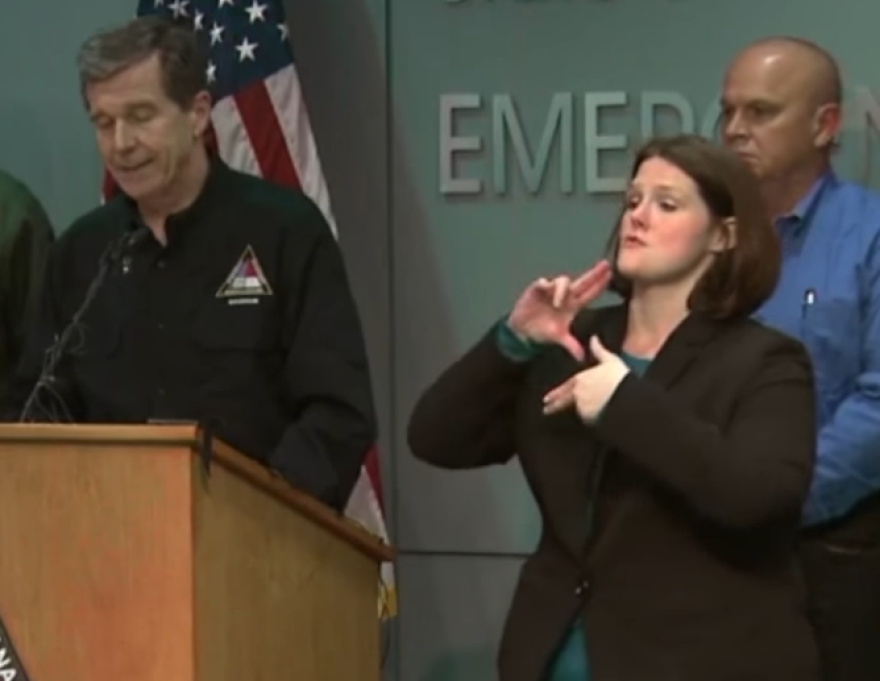When a hurricane or other major disaster hits North Carolina, the governor is typically the face of the state’s response. The person next to him at press conferences might be a close second.
We're referring to the person translating the governor into sign language. Monica McGee has been translating for governors for five-and-a-half years, although signing is something she’s had to do all her life. McGee usually gets notes ahead of time on what the governor will say, but sometimes she has to wing it. She spoke to WFAE Morning Edition host Marshall Terry.
This interview has been edited for brevity. You can hear the full interview above.
Q: What do you do during last-minute press conferences in which you have not been given notes ahead of time?
A: Sometimes I have to hang back a second and listen to them for a minute and then interpret. In terms of time, that’s the difference. But in general the level of difficulty is the same.
Q: What happens when you get behind?
A: I have to catch up. Normally, I am working with another signer, Lee Williamson. If I am behind he will tell me what I've missed or he will do what we call feeding each other. He will give me a feed from where he's sitting in the audience and oftentimes I can incorporate the feeds into what I'm interpreting and that helps me catch up. Also, sometimes the pace of the presenter helps because it gives me a little bit more time when they’re speaking to get caught up with where they are.
Q: When did you first start doing sign language?
A: I became a sign language interpreter in 2009. I had graduated from the University of North Carolina Greensboro. Both of my parents are deaf, so I've known the language my entire life. I just didn't think that I could have a job in it until I got to college.
Q: Why did you go into sign language professionally?
A: Because I saw a lot of injustices to my parents and how they continuously received unqualified interpreters or sometimes no interpreters for appointments or situations that they found themselves in in the public even though there's a law for it. They still had to fight tooth and nail just to get communication access to everyday interactions with people, particularly in the medical field. As a child my parents relied on me to interpret because sometimes that was their only option. It was very challenging. Imagine a six-year-old child having to interpret things that have a Ph.D. level or at a doctor's level. The six-year-old is not going to be qualified and not know the vocabulary and not adequately be able to do the job a certified sign language interpreter would be doing.
Q: What's the hardest part of being up there during press conferences signing?
A: The most challenging part for me is the media questions. We don't know exactly what will be asked. Sometimes it’s relevant to what's happening and why we have press conferences. Sometimes it's related to something else completely.
Q: Do your hands get tired?
A: Not normally. My shoulders mostly do get tired because I'm holding my arms up with a lot of repetitive motion. But because this is my job, my stamina is fairly high.
Q: What do you do when you get thrown a curve ball like a slang phrase or a colloquialism that maybe doesn't have a direct or clear translation in sign language?
A: If I have time I will elaborate on what it means. Sometimes those phrases or colloquialisms do not readily translate into American Sign Language and we do have to give an American Sign Language version or interpretation of that phrase. If not, I stick with the same phrase and throw in a similar meaning of what it might mean at that time and then just keep rolling with the interpretation. The governor and other officials often compare storms to animals or compare storms to a fighter and talk about packing punches. With that normally I explain that it’s an intense storm. I give more of a meaning behind it rather than a literal interpretation.


